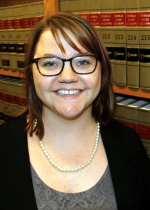Why my faith calls me to work with refugeesPosted Feb 25, 2015 |
 [Episcopal News Service] Micah 6:8: And what does the Lord require of you? To act justly and to love mercy and to walk humbly with your God.
[Episcopal News Service] Micah 6:8: And what does the Lord require of you? To act justly and to love mercy and to walk humbly with your God.
Justice and faith are like peanut butter and jelly; they naturally go together.
Justice has multiple definitions, legally and morally, but I think of justice as that 1990s adage and bracelet I proudly wore: What Would Jesus Do (WWJD)? I believe Jesus would want us to love and act radically to help those in need. Today, those in need include the world’s 15.5 million refugees.
I am so excited to continue my faith journey by joining eight Episcopalians on a pilgrimage in March led by Episcopal Migration Ministries to Kenya and Rwanda. During this trip, my group will visit a refugee camp and meet with various nongovernmental organizations, government stakeholders and organizations that help refugees. We will be blogging and posting about our trip on social media using the hashtag #ShareTheJourney. We invite you to follow the virtual pilgrimage on our media hub: www.episcopalchurch.org/sharethejourney.
Most of the refugees we will meet come from the Democratic Republic of the Congo, a country ravaged by decades of unrest and war. Individuals and families forced to flee in order to escape violence are certainly the vulnerable whom Jesus called on us to serve. That is why the work of resettlement is so important. During the #ShareTheJourney pilgrimage, we will work to raise awareness about the plight of refugees and lift up the work that the church does to help them.
The Domestic and Foreign Missionary Society, through Episcopal Migration Ministries, works in partnership with its affiliate network, along with dioceses, faith communities and volunteers, to welcome refugees from conflict zones across the globe. In 2014, the church and its affiliates provided safety, security and a new beginning for 5,155 refugees across the United States.
The pilgrimage is the next step in my journey combining faith and justice. Through the Gospels we know about Jesus breaking well-established laws and social norms to revolutionize the idea of justice, calling each of us to work to help our sisters and brothers in Christ: “Anything you did for even the least of my people here, you also did for me” (Matt. 25:40).
Who are “the least of my people?” The “least” are those must vulnerable in society. As I get ready for my work with refugees, I reflect on my past work with other groups of people in vulnerable situations. I have worked with survivors of domestic violence in Washington, D.C., women brutalized by the very partners who had taken vows to love and cherish them. I also worked with female migrant domestic workers in Hong Kong through The Episcopal Church’s Young Adult Service Corps. These were women who went abroad to work to support their families but instead encountered abusive employers and slavery-like conditions.
Helping these women, through either a church group or secular organization, I see the work as my small contribution to promoting a biblical view of justice. I am not just helping these women to meet their basic needs. Rather, I also am empowering women to fight for their rights and advocate for justice in their own lives.
Justice is more than meeting basic needs, though. Justice also is working to address the root causes of why people’s needs are not being met. The Episcopal Church lives out its goals of social justice by advocating for refugees.
Through the Domestic and Foreign Missionary Society’s Washington, D.C-based Office of Government Relations and the nationwide Episcopal Public Policy Network, The Episcopal Church works to raise awareness among elected officials to ensure continued support of the refugee program. I believe that the church’s advocacy efforts are an integral part of this work. It is not enough to feed and clothe those in need. We also must work to transform unjust structures in society that oppress or even dismiss these concerns. Striving for justice is not always easy, but it’s what Jesus called us to do.
I invite others to #ShareTheJourney in whatever way they can: by sharing this hashtag; by watching a video of the church’s Feb. 19 webinar on Congolese refugees; by reaching out to local Episcopal Migration Ministries affiliates; by connecting with other refugee organizations; by inviting a refugee or advocate to speak at a Sunday church forum; by following our group’s trip blog; or by praying for refugees and those who work for justice for refugees.
As the body of Christ, we can work together to promote the justice of helping refugees and continue striving for justice as Jesus called us to do.
— Spencer Cantrell is a lawyer and is the gender violence fellow at the National Immigrant Women’s Advocacy Project. A former Young Adult Service Corps missionary and lifelong Episcopalian, she is from Savannah, Georgia, and now lives in Washington, D.C.

Social Menu